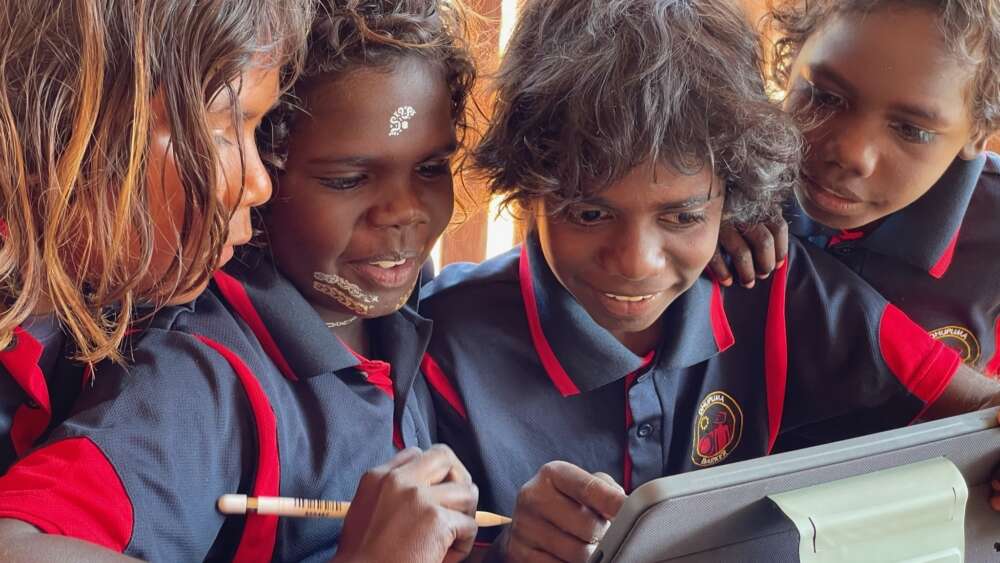'Schools of conscience should get behind this ...'
Private schools urged to partner with First Nations communities
The headmaster of Sydney’s prestigious Barker College, Phillip Heath, has called on Australian private schools to do something about the educational disadvantage facing Aboriginal and Torres Strait Islander children.
He proposes that private schools partner with remote communities to create on-country bilingual campuses, such as Dhupuma Barker in Northeast Arnhem Land, which was set up in partnership with the Yothu Yindi Foundation in 2021.
“There should be 50 of these kinds of schools around the country, if not more,” said Heath.
“Independent schools face the challenge of demonstrating to the community what is their purpose and what is the good of them, other than for their own population. We enjoy benefits and resources. It’s reasonable for the community to say, ‘What are you doing with that, other than prospering your own population?’ So schools of conscience should get behind this kind of opportunity because the need is profound.”
“There was a trust given to us [Barker College] to do a good job to fulfil his dream and the dream of many, which was to see the old Dhupuma College reborn.” – Phillip Heath
Heath cautions, however, that such joint ventures can only move as fast as relationships built up with the remote communities will allow, in order to avoid any trace of white paternalism.
“That’s the last thing you want. And after more than two centuries of that kind of conduct, it’s time to find a different way forward. But we have time; we know that the need is very profound. We also know, in a more enlightened way, that government is looking for these kinds of initiatives. We don’t have the kind of sectarian quarrels that we once did – if I could use that language. My experience in working with the Territory governments is that people see opportunities and are satisfied to support them provided they’re comfortable that they have integrity.”
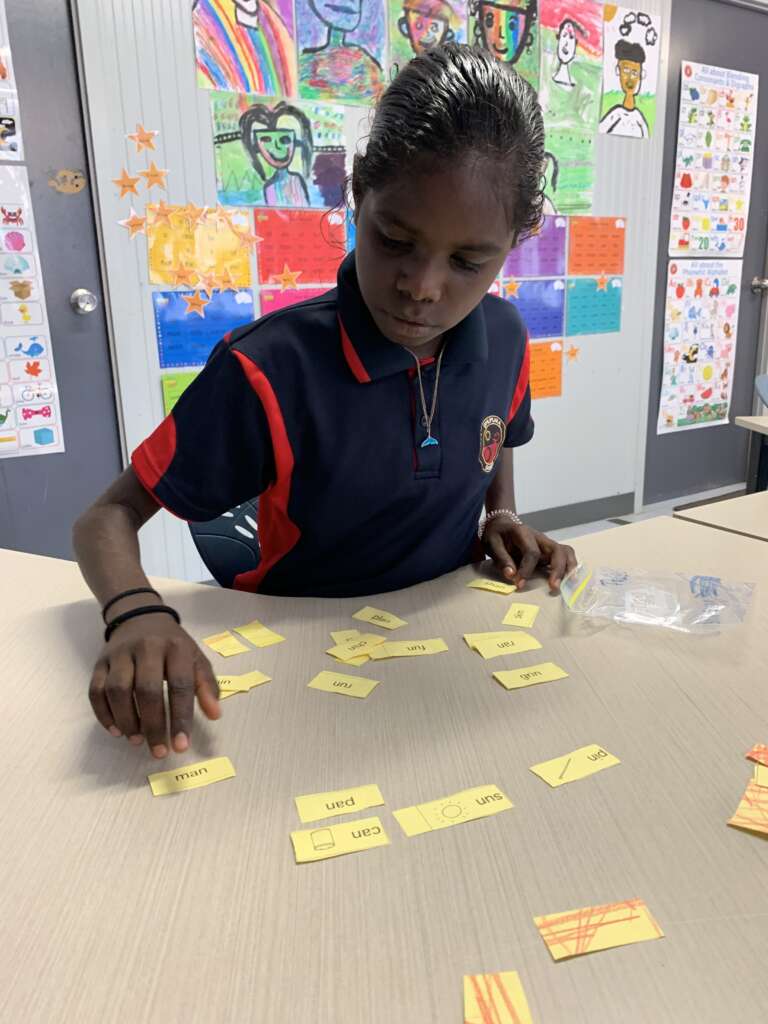
A Dhupuma Barker student.
Heath was speaking to Eternity after a visit to Dhupuma Barker in the 200-person Yolngu community of Gunyangara to attend the funeral ceremony of revered elder and Indigenous land rights campaigner, Galarrwuy Yunupingu, who died in April, aged 74.
“It’s quite a privilege to be in that community. The school closed for the duration of the ceremony. My role was to support the teaching staff up there, and we took the children out on country every morning. So the kids fully participated.”
Heath has returned from this experience with a renewed determination to honour the legacy of Yunupingu, who “was absolutely committed to his community, his family, and his people” and its contribution to the national life.
“There was a trust given to us [Barker College] to do a good job to fulfil his dream and the dream of many, which was to see the old Dhupuma College reborn.”
Cultural learning is a two-way street …
Dhupuma was opened 40 years after the NT government abruptly closed down the original government school in the area, Dhupuma College, leaving the community in shock.
Some graduates of that school went on to set up the award-winning Yothu Yindu rock band in the 1990s, famed for its chart-topping anthem Treaty, and founded the Garma Festival of Traditional Cultures, Australia’s largest Indigenous gathering.
Many of the children who attend Dhupuma are descended from the Yunupingu family who established the Yothu Yindi Foundation, which has had a long-held dream to revive on-country education and establish a world-class education hub in Northeast Arnhem Land.
“It’s possible to educate kids in two worlds. If the balanda [white man’s] world could support the new world and we walk together, something beautiful can occur,” says Heath. “So I’ve come back with that very strong sense of responsibility to honour the old man’s legacy and to see that vision, which is shared by pretty much everybody in the community, universally and powerfully fulfilled.”
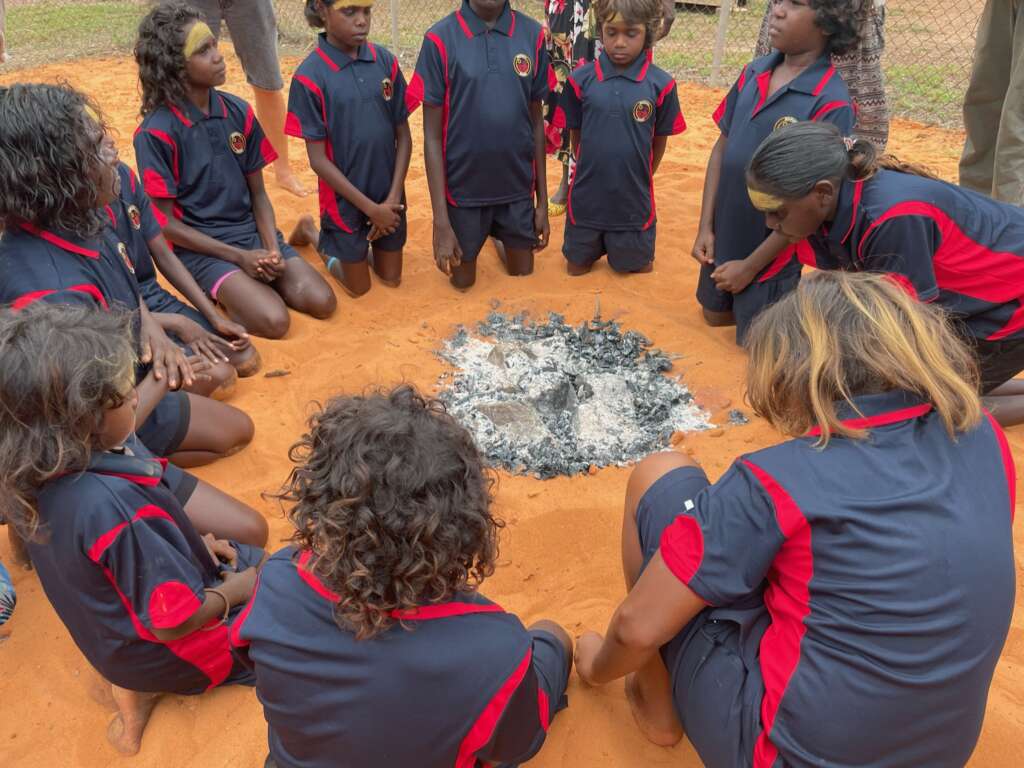
Dhupuma Barker students.
Thanks to an active fundraising effort, plans are well underway to start building a permanent school this year, replacing the shed it currently meets in, and extending the school from primary into secondary year groups.
“Those are two pretty big burdens to have on the heart. We’re reaching 40 children, of whom about 30 regular attendees, with attendance exceeding 80 per cent, which in remote Australia, is amazing. So most of the kids are going, most of the time.
“Then there’s another ten with casual or shared enrolments who come in from their homeland if there’s business or ceremony going on. They’ll be enrolled into two or more schools, which is fairly common in the Territory.”
About $10-20 million will be needed to build the new school, which has been designed in partnership with the community. It will be shaped like a boat anchor or necklace, a circle of buildings with a community building at the centre, an amenities block behind the “neck” and classrooms wrapped around. There will be a central covered play area, which can be a basketball court or a concert stage.
“You can just add more jewels to the necklace as you need more classrooms. We think it’s lovely,” he says.
“Rio Tinto [a local mining giant] have been very generous. They’ve given us $4 million towards it and we’ve been busily trying to raise funds down here in metropolitan Sydney. Some folk who’ve had that burden on their soul to see a good thing done in remote Australia are very supportive. But there’s a lot more to do. Despite the day-to-day funds, the Commonwealth and Northern Territory governments have not invested yet in this or in the capital works.”
For Heath, the dream of doing something to address Indigenous children’s educational disadvantage has been on his heart since 2004, when he was head of St Andrew’s Cathedral School in central Sydney. He was distressed by the Redfern riots, which led to the death of a 17-year-old boy in Redfern, two train stops away.
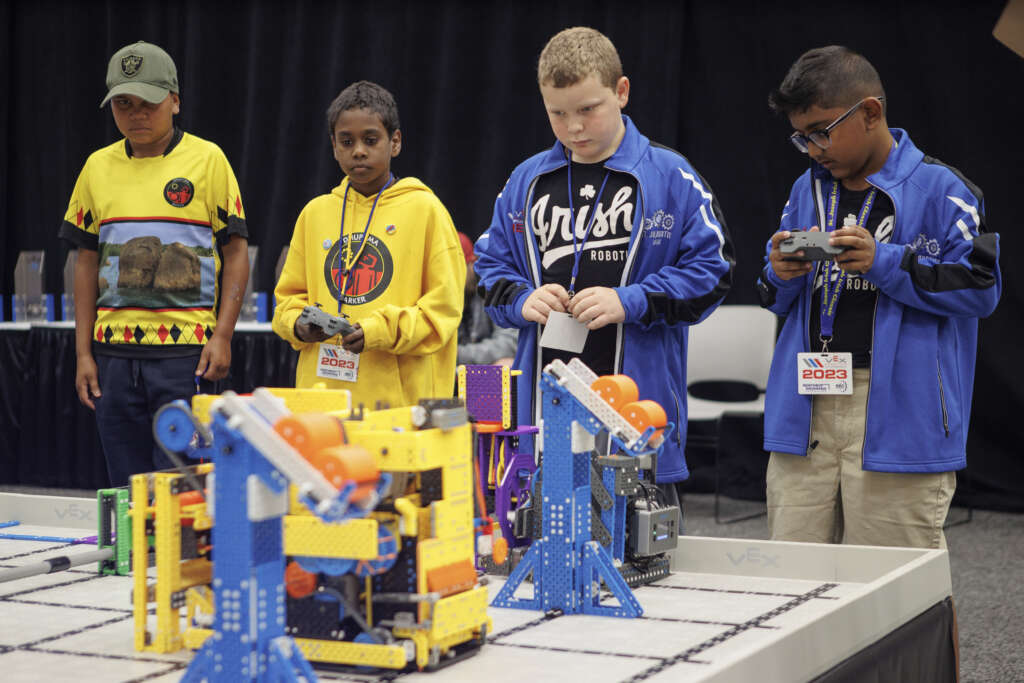
Barker Dhupuma students compete at the VEX Robotics World Championships in Dallas.
In 2007, he set up Gawura, a school within his school for Aboriginal children taught by ten Indigenous staff, which was voted Australian School of the Year in 2020.
When Heath became headmaster of independent Anglican school Barker College in 2014, he extended his vision to establish a school “on country”, so that younger children could be educated in their own area and culture. In 2016 he set up Darkinjung Barker in Yarramalong on the NSW Central Coast in partnership with the Darkinjung Local Aboriginal Land Council. In 2020 he started another offshoot, Ngarralingayil Barker, with the Kiray Putjung Aboriginal Corporation in Cessnock. These schools cater for 20 children from kindergarten to Year 6, after which they can continue their education locally or with a scholarship at Barker Hornsby.
But cultural learning is a two-way street. While the new schools have Aboriginal culture and language embedded into everything they do, these values are also taught at the main Barker campus. Non-Indigenous students learn Aboriginal history and culture, make regular visits to the on-country schools and keep in touch with kids of similar ages through a pen pal system.
“They can stay Yolngu kids and come in here, not as oddities, but as participants.” – Phillip Heath
“A school like this provides safe access into metropolitan Australia for remote kids who need to come down here. They don’t need to feel lost and abandoned from their cultural identity. They can stay Yolngu kids and come in here, not as oddities, but as participants because they’re partnering with an existing school that’s wrapping around them and saying, ‘You belong with us,’” Heath says.
“The reverse also happens when we send kids up to the Garma Festival or for the robotics event. They feel that they belong there. And Yolngu people are very good at welcoming.”
Heath is referring to a recent venture between Dhupuma and Hornsby where a team competed in robotics championships in Sydney and then in Dallas.
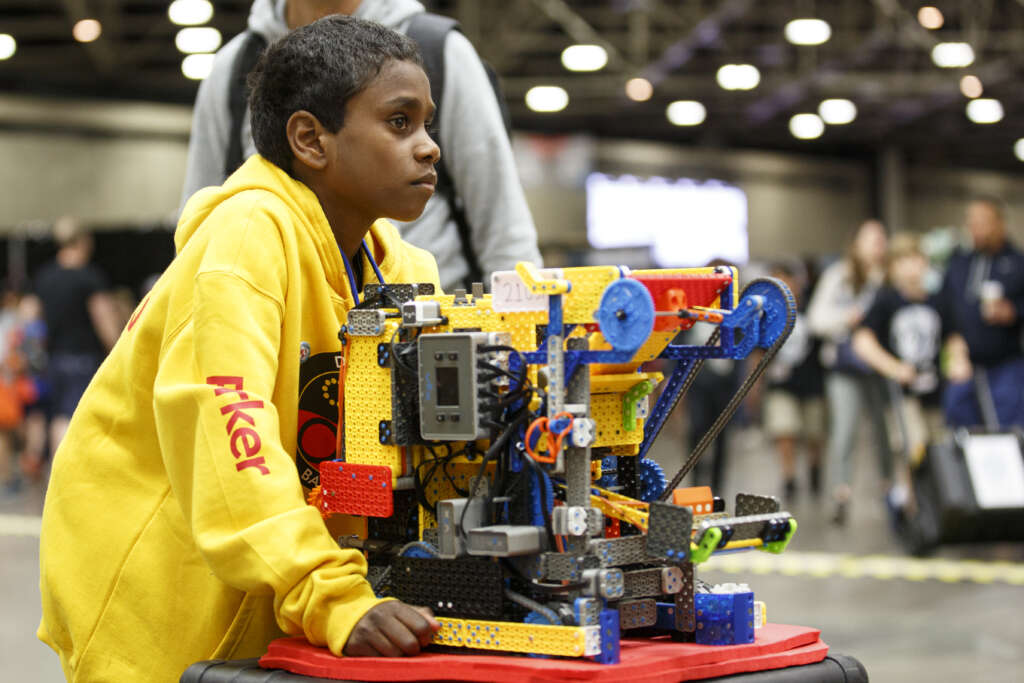
A member of the Barker Dhupuma team at the Robotics World Championships.
He’d asked Hornsby’s robotics people to visit Dhupuma during a visit by US Ambassador Caroline Kennedy so that there would be stimulating event to attract kids to come to school. “Well, it was an astonishing success!” says Heath. “We thought it would go well, but the kids were there for hours. They loved it and they were good at it. That’s the part that was underestimated by all of us, frankly. On the strength of that, the robotics people here said, ‘Why don’t we take them to Sydney, to the national champs in December and put in a team?’ And I said, ‘Really?’
“So they came down here and, in the area of coding, they were ranked first in Australia and in the overall competition ranked fourth and qualified for the world finals in Dallas, Texas.”
So from 25 April 25 to 4 May, the Firebirds team spent a week in Dallas competing against 800 teams of five to ten players in the VEX Robotics World Championships.
“That gives you a sense of the scale – it’s a vast series of convention halls where these events occur. It was almost half a kilometre walk from the pits where their robot was between matches and the field in which they were playing. They took it all in their stride.”
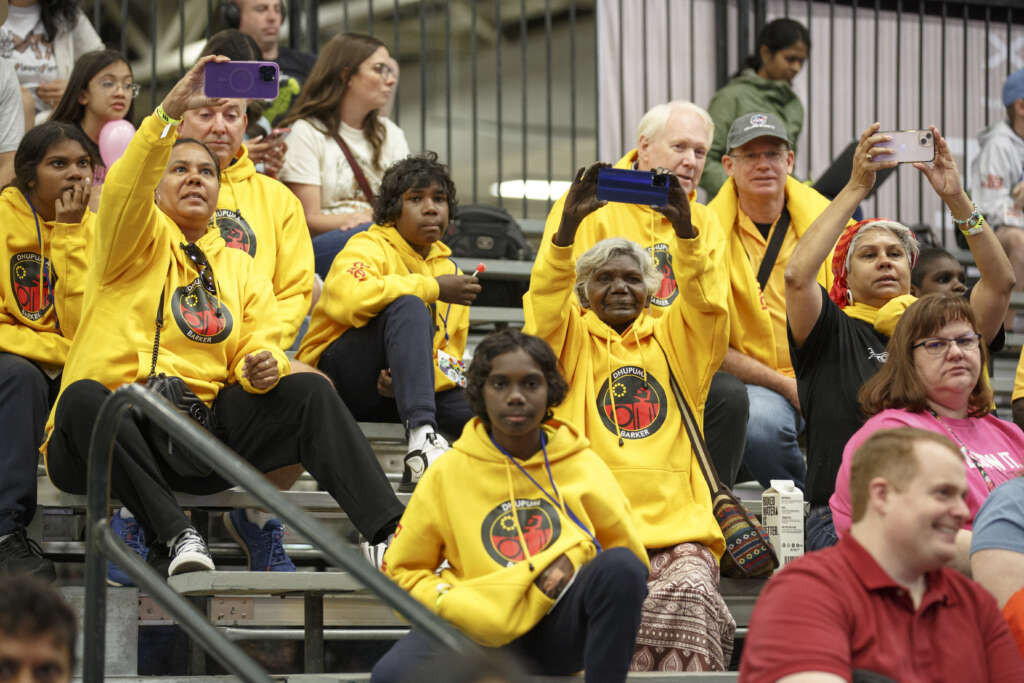
The Barker Dhupuma team at the Robotics World Championships, with Phillip Heath at the back (without a cap).
While things didn’t quite go their way, they were ranked 40th in their division and were in the top half of the world finals – the only Indigenous team in the world to qualify for the finals – and driving the only robot in the Northern Territory.
“Everything was against them – no competition experience, no training, straight into it and to land top half. And again, if the wind had blown in our direction and a few things had gone our way, we could have been further up than that. There’s a lot of grounds to be proud of them,” says Heath, who was with the team in Dallas.
As a committed Christian, Heath sees something beautiful in how the Yolngu have “almost an incarnation view of connection that we come and walk among them. We pitch our tent among one another and live in each other’s worlds for a season. The notion of the incarnation as a concept is so powerful. It’s not restricted to the way that God satisfied the challenge of righteousness. It’s a metaphor for all human reconciliation, that we enter each other’s story for a while in the fullest measure so you understand what it feels like.
“That’s what informs much of the thinking about how we do education when the things we are teaching in Sydney have no relevance. So we have to reshape it.
He prays that, “God will raise up the resources and the people to do something good and beautiful and that an incarnation view of ministry will emerge across the land – and the best source of reconciliation is the incarnation. Enter each other’s world. Don’t judge it; enter it and seek peace and forgiveness through it.”
Email This Story
Why not send this to a friend?
